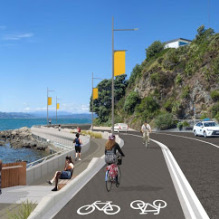
Benoit - 2 Juin 2021
Après le vote pour le plan à 10 ans du budget de la mairie de Wellington, réflection sur sa pertinence, dans le contexte de l'urgence climatique
Last Thursday, the Wellington City Council voted on the Long Term Plan.. One of the most salient points was the budget allocated to build a complete cycling network across the city. A whopping $226m will be spent over the next 10 years, with a fourth of it spent during the next 3 years. That's very impressive and will finally create a safe, inviting route for Wellingtonians who have been wanting to ditch their cars, but didn't out of safety concerns, or because it was just impractical. It shows the city's commitment towards sustainable transport and is perhaps the first real positive outcome this term.
Of course, one commentator pointed that funding was a good step forward, but the hard work lies ahead, when each lane, each cycleway will undoubtedly face some sort of opposition, or even aggressive behaviour. We've witnessed first-hand how the simple presence of a bike on a road can infuriate some people. Had they not been behind a wheel or the protection of their ute, we wonder if they'd have spit or screamed or yelled at the passing bike rider. But at least there is a clear mandate now, a clear direction, and it'll be harder and harder for bike opponents to get heard. Good riddance.
Now, looking forward, the going will get tough. Tamatha Paul, Wellington City Councillor in charge of climate change, laid it out plainly on Sunday: "There will be a period where it’s inconvenient and uncomfortable but we have to get through that together". This echoes discussions I had with other city council officers and other elected members: we are being asked to "sacrifice" some comfort and ditch the car. For some, it won't be a compromise, it'll even be an opportunity. But for many, jumping on the emissions reduction wagon will be a journey. But we're all in this together, and if COVID has taught us something, when New Zealanders truly commit to something, they deliver.
Finally, now that the Council has given the city a powerful tool to reduce its emissions, it must now turn its focus to the biggest polluters of all, the Airport and Centreport. It is essential these two biggest contributors to the city's emissions are called out, and there should be a plan to reduce their emissions (from the traffic they generate on land, sea and air). It'd be unthinkable to have, on one hand, ratepayers funding giant cycleway networks and Wellingtonians changing their lifestyle, and on the other hand, two big businesses let loose or even expanding.
Only by asking everyone, residents and businesses, to make an effort can the City Council hope to paint a coherent, fair plan to get the city on the path to a sustainable future.
Benoit, le 2 Juin 2021
opinion, insideWellington, airport, centrePort, longTermPlan
Article on Inside Wellington

